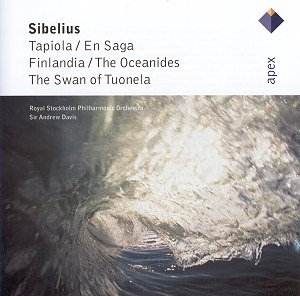With good orchestral playing and intelligent conducting
this Sibelius compilation has much to commend it. The Stockholm connection
has a strong tradition as far as this composer is concerned, including
the 1924 premiere of the Seventh Symphony, and the authenticity of the
orchestral sound world is never in doubt at any stage.
The recording too is clear and well focused, if cut
at a relatively low level. However, any reasonably good equipment can
provide the necessary boost, if domestic circumstances allow such a
thing. This was originally recorded for Finlandia in 1996, and is now
taken up by Warner Classics' Apex series.
Someone at Warner ought to have another look at the
design of the booklets for this series. Why have such tight-packed small
print on glossy paper when the whole of the back page of the four pages
is left entirely blank? It makes no sense.
As for the performances, any criticisms are on the
level of interpretation, by the listener as well as by the artists;
for anyone acquiring this disc can be guaranteed the satisfaction of
knowing that the music is well served. The climaxes build with a brooding
intensity that is thoroughly Sibelian, though occasionally, and particularly
in Tapiola, that intensity might have reached a darker power.
There is also a sense of structural control and the
longer term vision this implies. In this respect Tapiola goes very well;
here and elsewhere the tempi always seem right for the purpose. Of course
the field of recordings of this repertoire is very competitive, featuring
some real 'classics of the gramophone'. And it is no use pretending
that Davis matches Beecham in the nuances of texture and phrasing that
make such miraculous effect in The Oceanides. Beecham remains a clear
leader in this piece, partly because his recording from the late 1950s
still sounds so well. The word 'historical' need not apply on this occasion.
Sometimes the orchestral balances for Davis and the
Stockholm orchestra have a pallid feel, and the two most notable and
extended solos in these pieces both suffer in this regard. The great
cor anglais solo in The Swan of Tuonela is surely too recessed in the
perspective, with a resultant lack of brooding intensity. So too the
closing phase of En Saga allows too little of the clarinet's personality
to make its mark.
Such doubts need to be placed in the context, however,
of the thoughtful and sensitive performances of a true Sibelian.
Terry Barfoot

![]() Royal Stockholm Philharmonic
Orchestra/Sir Andrew Davis
Royal Stockholm Philharmonic
Orchestra/Sir Andrew Davis ![]() APEX 09274 06202 [75.48]
Budgetprice
APEX 09274 06202 [75.48]
Budgetprice